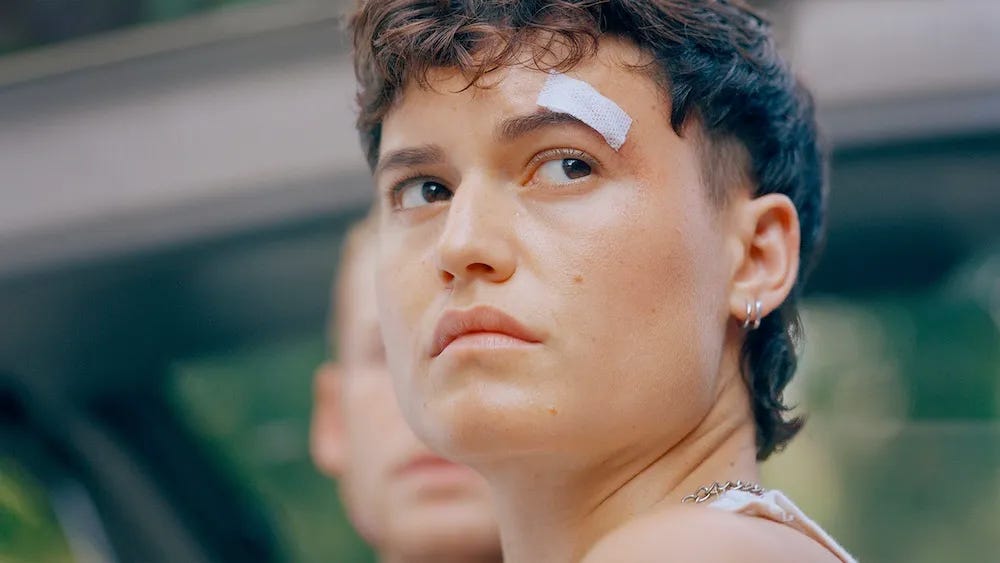The Yearning Rating: ✰✰✰
Romance: ✰✰½
Sex: ✰✰✰
Storytelling: ✰✰½
Performance: ✰✰✰
Yearning: ✰✰✰✰✰
Hitting the like button does wonders for our growth (but more importantly, our ego <3)
Some light spoilers ahead!
Written by Ali Romig
Breakup movies are hard. And I don’t just mean emotionally hard (although, yes), but hard in the sense that they’re so prolific, the universal feelings inherent in them can begin to come off as clichéd. “Two exes meeting up after years apart” is well-trodden narrative fodder, and while watching this emotional gut-punch of an encounter on screen may help some people feel seen, it can also feel like a dilution of the lived experience. After all, a breakup is one of the most personal experiences a person can go through—so then, why do so many end up looking the same?
I thought about this question a lot while watching Vuk Lungulov-Klotz’s debut feature Mutt, a slice-of-life narrative following Feña, a trans man, throughout a twenty-four hour period in New York City. The film features many “breakup movie” cliches—the unexpected bar encounter, the night spent catching up, the slow slip back into intimacy. And while this is all undoubtedly familiar, in this film it never feels contrived. In fact, I think that by not going out of its way to reinvent the wheel, Mutt zeros in on the breadth of emotions that accompany these well-known moments. Which is, after all, maybe why they continue to ensnare us.
I should make it clear up top that Mutt is not only about a romantic breakup. In some ways, the film sets itself apart by examining many kinds of severed ties; among these, familial separations and the unique kind of distance that one might try to put between them, now, and a past version of themselves. Split into three acts, Mutt begins with Feña (Lio Mehiel), who is about two years into his transition, running into his ex while out with friends. John (Cole Doman) dated Feña pre-transition and hasn’t seen him since. It becomes clear quickly that Feña broke John’s heart as the two embark on a night of timid reconnection. The next morning, Feña unexpectedly finds his little sister, Zoe (MiMi Ryder), waiting for him at the restaurant where he works. Zoe, who snuck out of school, begs Feña to let her spend the day with him. He agrees, while worrying about how their transphobic mother has been treating Zoe since he left. Finally, the day ends with Feña picking his dad up at the airport. His dad lives in Chile and the two haven’t seen each other in three years. Pablo (Alejandro Goic) is a soft-spoken man who does seem genuinely happy to see his child, but still holds deeply problematic views about Feña’s trans identity.
The movie moves at a quick clip, which may be a function of its day-in-the-life structure. Feña is constantly in motion—either trying desperately to get cash, get his sister home, or borrow a car to pick up his dad. I think this mostly works, as Feña’s presented as someone who is always going from one thing to the next, who can’t settle for fear of what might happen. We get a sense that he’s always been this way—maybe not running, but searching.
For Mutt, there are a few moments, though, where the fast pace gets in the way of more meaningful character development. Some of the dialogue, for instance, ends up coming off as a bit on the nose; and there are one or two scenes that stick out as awkward—clearly there solely to advance the plot. One such scene, in which Feña falls jumping a turnstile, left me particularly confused. The fall is rather tame—sort of a blink-and-you-miss-it affair—yet it leaves Feña with a giant gash on his forehead and blood running down his shirt. But hey! I’m not complaining because…Mehiel in a bloody muscle tank is hot! The resulting bandage that he wears for the rest of the movie gives major The Outsiders energy, which I can imagine is at least a little gender-euphoric.
The performances in the movie more than make up for the occasionally clunky storytelling, as each actor brings a lived-in quality to not only their characters, but also their messy interpersonal relationships. I fully believed in the histories between each of them. As the eye of the storm, Mehiel is able to juggle multiple emotionally devastating threads and treat each one with equal amounts of tenderness and exhaustion. And on top of that, their Feña moves through life with a subtle but notable amount of fuck-boi energy, which adds an interesting and very human layer to the character. Pablo represents a complicated brand of parental grief, and Goic’s portrayal of this is beautifully nuanced, eliciting a surprising amount of sympathy from this viewer. Finally, Doman as Feña’s ex, John, brings a stinging, almost stubborn quality to his heartbreak that makes his scenes particularly memorable.
While breakups are as prevalent in film as breastplates are in this season of RPDR, what is unfortunately still incredibly rare and unique is such a delicate character study of a trans man in mainstream media. Feña’s trans experience is inextricably woven into every moment of the film; every interaction is handled with authenticity and care by Lungulov-Klotz, who is himself trans. The reconnections Feña makes throughout—with his ex, his father, his sister—aren’t just reunions, but reintroductions. It is one thing to try and incorporate someone from your past into your present, but it is another thing altogether to make yourself vulnerable to the possibility that they may not see you for who you are. The movie asks an important question: where is the line between trying to make someone understand, and letting them go? For many of the characters, the line isn’t particularly clear; but it does draw one refreshingly hard boundary in the sand. Feña has no interest in seeing his abusive, transphobic mother again, nor does he feel any obligation to.
One of the quieter moments of the film finds Feña and John waiting out a storm in an empty laundromat. The scene is charged—both emotionally and sexually—as the two rediscover each other. The liminality of the space reflects how their connection defies so much—gender, labels, and past hurts—but it also seems to indicate that whatever it is they have, it can’t last. Later, Feña accuses John of being unable to love him as a trans man, but John scoffs at this accusation. It’s not who Feña is now that John can’t reconcile with, but who he was then: the one who broke his heart. Sometimes it’s the ways we don’t change that shape us rather than the ways we do.
This isn’t a movie about just any breakup, it’s a movie about Feña’s. Endings, of all kinds, are unavoidable, and so movies about them are fairly easy to come by. But while the experiences may look the same at first glance, everyone moves through them in a way that is utterly unique to them. Which is why nailing the characters in a movie like this is paramount. And Mutt does just that.
Mutt is now available to stream on Netflix!
The Elephant in the Werkroom
Season 16, Episode 3:
We’ve got gags on gags, ladies!!!! I remember at the start of Season 15, naively trumpeting the fact that RPDR seemed to be getting back to its humble beginnings (meant as a good thing!), and now…all of that is out the window. Rate-a-Queen? Immunity??? What in the Survivor is going on?
No but really, how are we feeling about all these bells and whistles? Is it too soon to tell? I, for one, am wondering, if we’re rating queens in regular seasons, what does that mean for All Stars?
The “Eeyore of Drag” is a title I won’t be forgetting.
Nymphia is ABSOLUTELY on to Plane Jane and I can’t wait to see how this all shakes out…ESPECIALLY if alliances are coming into play.
It’s a ball, y’all! Nymphia as Little Boy Blue has my heart, and Amanda as Michelle Visage will forever haunt me.
Hershii saying “It’s chocolate!” upon exiting? Instant icon.












